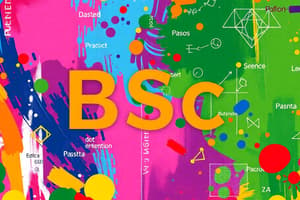Podcast
Questions and Answers
What is a prominent focus in the BSc 1st year curriculum?
What is a prominent focus in the BSc 1st year curriculum?
- An introduction to foundational science principles (correct)
- Exclusive study of advanced topics
- Deep specialization in a field
- Only theoretical concepts with minimal practical work
Which subject includes an exploration of cell biology and genetics?
Which subject includes an exploration of cell biology and genetics?
- Computer Science
- Chemistry
- Biology (correct)
- Physics
What assessment methods are commonly used in the BSc 1st year?
What assessment methods are commonly used in the BSc 1st year?
- Exclusively theoretical exams
- Mid-term exams, final exams, and lab practicals (correct)
- Practical assessments only
- Group projects with no examinations
Which skill is emphasized during the BSc 1st year?
Which skill is emphasized during the BSc 1st year?
What topics are usually included in the Mathematics curriculum?
What topics are usually included in the Mathematics curriculum?
What is a recommended study tip for BSc 1st year students?
What is a recommended study tip for BSc 1st year students?
Which of these subjects is NOT typically part of the BSc 1st year's core subjects?
Which of these subjects is NOT typically part of the BSc 1st year's core subjects?
What is one of the future pathways after completing the BSc 1st year?
What is one of the future pathways after completing the BSc 1st year?
Study Notes
Overview of BSc 1st Year
-
General Structure:
- Typically lasts one academic year.
- Introduces foundational concepts and principles in science.
-
Core Subjects:
- Common subjects include:
- Chemistry
- Physics
- Mathematics
- Biology (for Life Sciences)
- Computer Science (for certain specializations)
- Common subjects include:
-
Credits and Assessment:
- Courses usually carry specific credit values.
- Assessment methods may include:
- Mid-term exams
- Final exams
- Laboratory practicals
- Assignments and projects
Skill Development
-
Critical Thinking:
- Emphasis on analytical skills and problem-solving.
-
Laboratory Skills:
- Hands-on experience in labs to apply theoretical knowledge.
-
Research Skills:
- Introduction to basic research methodologies.
Typical Curriculum Components
-
Chemistry:
- Basics of inorganic, organic, and physical chemistry.
- Lab work focusing on chemical analysis and synthesis.
-
Physics:
- Understanding of fundamental concepts like mechanics, waves, and thermodynamics.
- Experimental physics to reinforce theoretical concepts.
-
Mathematics:
- Topics such as calculus, algebra, and statistics.
- Application of math in scientific contexts.
-
Biology:
- Exploration of cell biology, genetics, and ecology.
- Practical lab sessions to study biological processes.
-
Computer Science:
- Introduction to programming, algorithms, and data structures (if applicable).
- Practical coding assignments to build proficiency.
Study Tips
-
Regular Study Schedule:
- Allocate time blocks for each subject weekly.
-
Active Participation:
- Engage in classroom discussions and laboratory sessions.
-
Group Study:
- Form study groups for collaborative learning and problem-solving.
-
Resource Utilization:
- Use textbooks, online resources, and library materials for deeper understanding.
-
Practice Past Papers:
- Familiarize yourself with exam formats and question styles.
Future Pathways
-
Specialization Options:
- Opportunities to specialize in fields like Biochemistry, Environmental Science, Mathematics, etc., in subsequent years.
-
Further Studies:
- Foundation for pursuing postgraduate degrees or professional courses after BSc.
This first year is crucial for establishing a solid groundwork for more advanced studies in chosen fields.
BSc 1st Year Overview
- Typically lasts one academic year
- Introduces foundation concepts and principles
- Core subjects include: Chemistry, Physics, Mathematics, Biology, and Computer Science
Credits and Assessments
- Courses have different credit values
- Assessment methods include:
- Mid-term exams
- Final exams
- Laboratory practicals
- Assignments and projects
Skill Development
- Develops critical thinking, analytical, and problem-solving skills
- Practical lab experience applies theoretical knowledge
- Introduces students to basic research methodologies
Curriculum
Chemistry
- Basics of inorganic, organic, and physical chemistry
- Lab work on chemical analysis and synthesis
Physics
- Understanding of mechanics, waves, and thermodynamics
- Experimental physics reinforces theoretical concepts
Mathematics
- Topics include calculus, algebra, and statistics
- Application of math in scientific contexts
Biology
- Exploration of cell biology, genetics, and ecology
- Practical lab sessions to study biological processes
Computer Science
- Introduction to programming, algorithms, and data structures
- Coding assignments develop proficiency
Study Tips
- Create a regular study schedule
- Engage in classroom discussions and laboratory sessions
- Form study groups for collaborative learning and problem-solving
- Utilize textbooks, online resources, and library materials for deeper understanding
- Practice past papers
Future Pathways
- Specialization options include Biochemistry, Environmental Science, Mathematics, etc.
- Foundation for postgraduate degrees or professional courses
Studying That Suits You
Use AI to generate personalized quizzes and flashcards to suit your learning preferences.
Description
Explore the foundational concepts and core subjects in the BSc 1st Year program, including Chemistry, Physics, Mathematics, and Biology. This quiz also highlights skill development in critical thinking, laboratory practices, and research methodologies essential for science students.




